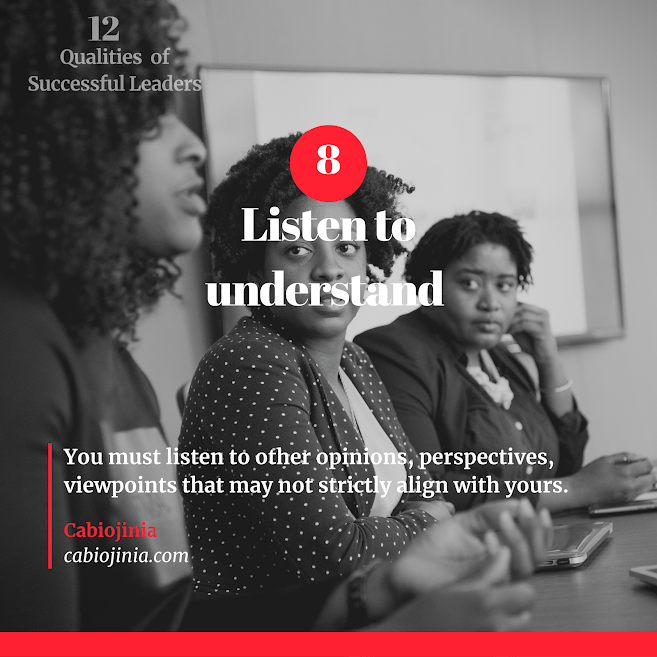Fools find no pleasure in understanding but delight in airing their own opinions.
proverbs 18:2
Effective leaders listen to understand.
It’s in the nature of man to seek to be heard and understood. Sometimes this trait plays out unconsciously as we can’t wait for other people to get through with their opinion before we bare ours- there’s an inner push to talk. And if analysed, we’ll discover that we never listened while the other people spoke. We just wanted everyone to hear us (our point of view) and possibly take our opinion as the truth and roadmap.
Now, that attitude is bad. But it becomes even worse when you are a leader who is simply interested in getting your opinion carried without listening nor accepting inputs from others.
To become an effective leader, you must conquer this trait. You must be willing and comfortable at listening to other perspectives and try to understand them. After which you can seek to be understood. Even when those perspectives may appear apparently flawed and infeasible, listen and make your observations later.
Some months ago, I watched an interview with a CEO of a big company. One of the things that struck me was his genuine desire to listen and evaluate viable inputs from his staff. He is not the most intelligent in the room, but he has the ability to listen to other opinions that may not align with his, evaluate them before making a decision.
This is one major factor that separates ordinary leaders from highly effective ones. Whereas ordinary leaders feel threatened by better opinions, effective ones understand that background and experiences vary, and most times could be an added advantage to an organization.
Some leaders view criticism as a minus; they think that anyone who criticises them is either jealous or after their office while anyone who supports their view is automatically an addition to the company/institution.
The way to keep a grip on your followers or team shouldn’t be through creating a dictatorial atmosphere or a reputation of a never-listen boss. You only fan the embers of disgust (or even rebellion) on one hand while brooding yes-men who only pay eyeservice on the other.
“He who answers a matter before he hears it, It is folly and shame to him.” Proverbs 18:13
Why you should listen to others as a leader.
There are a number of advantages of this quality – both for the leader and the led.
1. Listening to others helps you make informed decisions as a leader:
No one man can successfully run an organization. No single person can think, strategize and implement a plan. It’s almost impossible for a single individual to consider all the different aspects of a matter before taking a decision. T
here’s always a perspective you haven’t factored in because you’re human – limited in knowledge and understanding. You can know so much about a given subject but not everything. So, listening to other views enriches your knowledge upon which you can make an informed decision as a leader.
I like to listen. I have learned a great deal from listening carefully.
2. Also, listening to your team makes them feel important and their opinions valued.
Naturally, every person wants to be heard, listened to, valued and possibly praised. The feeling that one’s opinions count or at least would be considered creates a sense of value or fulfilment within. Value your team by listening.
3. A consequence of the above is that people begin to consider themselves an integral part of the organisation.
This is so important because as an integral part of the organisation, they’re willing to give their best, not because of you but because they feel the organisation is theirs as well.
4. When people sense that their opinions matter, they’re more prone to making more suggestions.
And you’re sure that any vital information will not be hoarded. But if they know that you’re rigid and won’t move from your stance, you’ll hardly ever hear them talk.
5. This is one of the ways to build trust and follower-ship in an organization.
When people see that you listen, they’re more drawn to your person and your vision and are more willing to follow.
6. It enhances creativity
Aside from a toxic working environment, the feeling that you’re just a robot that executes orders from above is one thing that stifles creativity and congeals talents.
If everybody is thinking alike, then somebody isn’t thinking.
George S. Patton Jr.
7. Allowing others to give their views on a given subject also helps them see the flaws in their opinions.
An idea in the mind (head) might seem fantastic until said to the hearing of one’s ears or written on paper. Then you see the loopholes. So, allowing others to express their views, in the long run, helps to improve their thought pattern as well.
8. Finally, don’t forget that we are humans.
We may be CEOs or simply staffers but we are still humans living and working in a community. We may have quarterly or yearly targets but let’s not forget that it’s men that build organisations, not just your goods and services.
Therefore, building healthy relationships should be paramount. Genuinely listening to lieutenants, co-workers creates a healthy atmosphere for everyone to live and thrive.
Courage does not always mean standing up to talk, it also means sitting down to listen.
The Bible says that “… in the multitude of counsellors there is safety.” Proverbs 11:14.
Kindly share this and other articles on this blog. God bless you.















